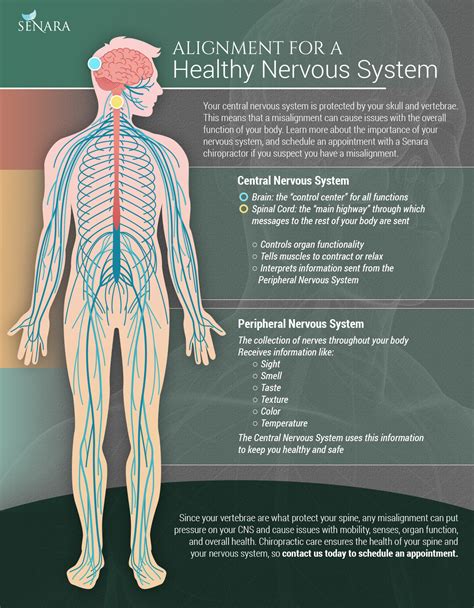Nerve Health - Importance and Tips
Nerve Health FAQ
How can a healthy body maintain nerve health?
Fruits, vegetables, whole grains, and lean proteins can provide your body with the nutrition necessary to maintain nerve health. Regular activity can help prevent and also control metabolic diseases such as obesity and diabetes.
What is nerve damage?
Nerve damage generally refers to the peripheral nervous system. There are two main parts of the peripheral nervous system. The somatic nervous system is responsible for voluntary movement, and the autonomic nervous system controls involuntary activity.
What nerves are responsible for a person's body?
These nerves are responsible for muscle movement, like walking, talking, or using your hands or arms. Sensory. These are responsible for sensory information, like hot or cold, pain, or touch. Autonomic. These are responsible for body processes you don’t see, like breathing, heartbeat, and digestion.
What are the symptoms of nerve damage?
Your symptoms often depend on which nerve fibers are damaged: Motor nerves. These nerves regulate all the muscles under your conscious control, such as those used for walking, talking and holding objects. Damage to these nerves is typically associated with muscle weakness, painful cramps and uncontrollable muscle twitching.
What happens if a nerve is damaged?
Damage to these nerves is typically associated with muscle weakness, painful cramps and uncontrollable muscle twitching. Sensory nerves. Because these nerves relay information about touch, temperature and pain, you may experience a variety of symptoms. These include numbness or tingling in the hands or feet.
What causes nerve tissue damage?
Vascular and blood problems that decrease oxygen supply to the peripheral nerves can lead to nerve tissue damage. Diabetes, smoking, and narrowing of the arteries from high blood pressure or atherosclerosis (fatty deposits on the inside of blood vessel walls) can lead to neuropathy.
Nerve Health References
If you want to know more about Nerve Health, consider exploring links below:
What Is Nerve Health
- https://www.nhs.uk/conditions/peripheral-neuropathy/
- https://www.healthdirect.gov.au/nerve-pain
- https://www.mayoclinic.org/diseases-conditions/peripheral-neuropathy/symptoms-causes/syc-20352061
- https://www.nhsinform.scot/illnesses-and-conditions/brain-nerves-and-spinal-cord/peripheral-neuropathy
- https://www.buoyhealth.com/learn/nerve-damage
- https://www.verywellhealth.com/neuropathy-types-5212788
- https://journalofnutrition.org/encyclopedia/what-is-nerve-health/
- https://www.healthline.com/health/peripheral-neuropathy
- https://www.ninds.nih.gov/health-information/disorders/peripheral-neuropathy
Nerve Health Information
Explore Related Topics
The role of dietary supplements in diabetes treatment
Discuss the potential benefits of dietary supplements in supporting diabetes management.
Chiropractic Care: An Alternative Route to Diabetic Neuropathy Relief
Consider chiropractic care as a viable alternative route to finding relief from diabetic neuropathy.
Unlocking the Potential of Chiropractic Care for Diabetic Neuropathy
Unlock the potential benefits of chiropractic care in addressing diabetic neuropathy concerns.
Magnesium: Essential Mineral for Diabetes Management?
Delve into the role of magnesium as an essential mineral in diabetes management and blood sugar regulation.
Cycling Innovations for Diabetic Neuropathy Management
Explore cutting-edge cycling technologies and approaches for diabetic neuropathy
Tai Chi and Neuropathy: Can Tai Chi Help Manage Diabetic Nerve Damage?
Discuss the potential of Tai Chi in alleviating symptoms of diabetic neuropathy
Herbal Supplements for Diabetes: Are They Safe and Effective in Holistic Healing?
Share experiences and insights on using herbal supplements for diabetes
Chiropractic Care: A Promising Path to Diabetic Neuropathy Relief?
Examine the promising potential of chiropractic care in providing relief for diabetic neuropathy.
Vitamin B Complex for Diabetic Neuropathy: Does It Help?
Examine the connection between vitamin B complex and diabetic nerve damage.
Exploring Chiropractic Techniques for Diabetic Neuropathy Management
Delve into the various chiropractic techniques that can aid in managing diabetic neuropathy.
Chiropractic Care as a Non-Invasive Approach to Diabetic Neuropathy
Discuss the use of chiropractic care as a non-invasive option for diabetic neuropathy management.
Diabetic Neuropathy Relief: A Closer Look at Chiropractic Solutions
Dive into the role of chiropractic solutions in providing relief for diabetic neuropathy.
Chiropractic Adjustments for Diabetic Neuropathy: Myth or Miracle?
Uncover the truth behind the effectiveness of chiropractic adjustments for diabetic neuropathy.
Can Cycling Help Manage Diabetic Neuropathy Symptoms?
Explore the impact of cycling on diabetic neuropathy and share your experiences
